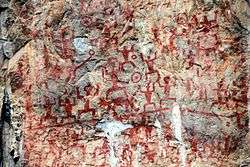Lạc Việt

The Lạc Việt (雒越; pinyin: Luòyuè) were an ancient people of what is today Guangxi in southern China and the lowland plains of northern Vietnam, particularly the marshy, agriculturally rich area of the Red River Delta.[1] They are particularly associated with the Bronze Age Đông Sơn culture of mainland Southeast Asia.[2]
The Lạc Việt are believed to have founded a state called Văn Lang in 2879 BC.[3][4] The people of Văn Lang traded with the upland-based Âu Việt people, who lived in the mountainous regions of what are today northernmost Vietnam, western Guangdong, and northern Guangxi, China, to their north, until 258 BC or 257 BC, when Thục Phán, the leader of the alliance of Âu Việt tribes, invaded Văn Lang and defeated the last Hùng king. He united the two kingdoms, naming the new nation Âu Lạc and taking a Sino-Vietnamese title, "peaceful virile king" (traditional Chinese: 安陽王; ; Vietnamese: An Dương Vương).[5]
See also
- Âu Việt
- Baiyue
- Đông Sơn culture
- Đông Sơn drums
- Southward expansion of the Han dynasty
- Văn Lang
- Vietnamese people
References
- ↑ books.google.com
- ↑ Anh Tuấn Hoàng Silk for Silver: Dutch-Vietnamese Relations, 1637-1700 Page 12 2007 "people of Lạc Việt."
- ↑ Ванланга цари — Монархи. Древний Восток — Яндекс. Словари
- ↑ Вьетнам
- ↑ books.google.com